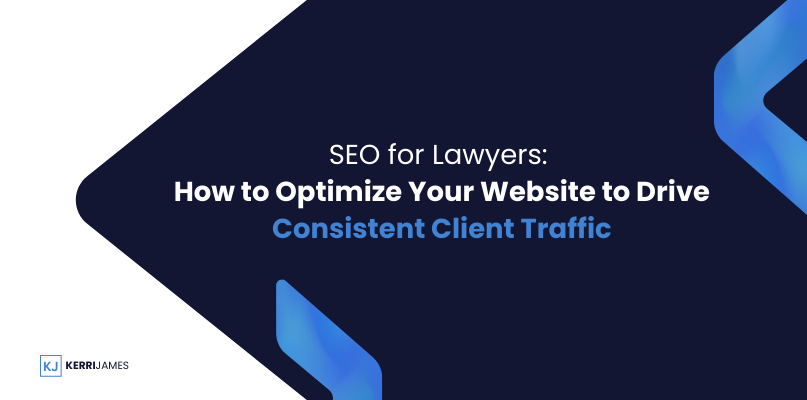In today’s digital landscape, having a strong online presence is essential for law firms looking to attract and retain clients. As more people turn to search engines like Google to find legal services, optimizing your law firm’s website for search engine optimization (SEO) has become a critical aspect of a successful marketing strategy. SEO is more than just getting your site to rank high in search results—it’s about ensuring that the right people find your site at the right time and are motivated to contact you.
For lawyers, SEO presents a powerful opportunity to consistently drive client traffic, increase leads, and grow your firm. However, it’s a complex and constantly evolving field. It requires more than just using the right keywords; it’s about optimizing your website, content, and entire digital footprint to ensure it ranks highly and converts traffic into clients.
In this ultimate guide, we’ll walk you through the essentials of SEO for lawyers, breaking down the key strategies that can help your law firm rank higher on search engines. We’ll also explore tools that can help you track traffic, conversions, and optimize your site for better performance.
Why SEO Matters for Law Firms
The legal market is highly competitive, and many law firms struggle to stand out in a crowded digital environment. SEO offers an avenue to differentiate your firm from the competition, capture the attention of prospective clients, and ultimately drive business growth.
Here’s why SEO is so important for law firms:
1. Increased Visibility
When potential clients search for legal services online, they rarely look beyond the first page of search results. Ranking high in search engine results pages (SERPs) ensures that your firm is visible to those who need legal help, increasing your chances of being chosen over your competitors. Effective SEO can put your firm at the top of the search results for keywords related to your practice areas.
2. Builds Credibility and Trust
Appearing on the first page of search results not only increases visibility but also enhances your firm’s credibility. When potential clients see your firm ranked highly for relevant search queries, they are more likely to trust your expertise and view your firm as an authority in your practice area.
3. Generates Qualified Leads
SEO helps drive highly targeted traffic to your website—potential clients who are actively searching for legal services. By optimizing your website for the right keywords, you attract leads who are more likely to convert into clients because they are already seeking legal assistance.
4. Cost-Effective Marketing
Unlike paid advertising, which requires continuous investment, SEO is a long-term strategy that can generate consistent, organic traffic to your website without ongoing costs. While it requires an initial investment in time and resources, a well-optimized site can continue to rank highly and attract clients for months or even years to come.
Key SEO Strategies for Law Firms
To optimize your law firm’s website for SEO, it’s important to focus on several key areas. These include on-page SEO (content and keyword optimization), off-page SEO (backlinks and online presence), technical SEO (site structure and performance), and local SEO (local search optimization).
Let’s dive into each of these strategies in detail:
1. Keyword Research and Optimization
Keyword research is the foundation of any successful SEO strategy. Keywords are the phrases or terms that potential clients use when searching for legal services online. By identifying the right keywords for your law firm, you can optimize your website content to match the search queries your target audience is using.
How to Perform Keyword Research:
- Use SEO Tools: Tools like Google Keyword Planner, SEMrush, and Ahrefs can help you identify keywords that are relevant to your practice areas and have a high search volume. These tools allow you to see what terms your competitors are ranking for and discover keywords that your firm can target.
- Focus on Long-Tail Keywords: Long-tail keywords are more specific search phrases that typically have lower search volume but higher conversion rates. For example, instead of targeting broad terms like “personal injury lawyer,” you might target “personal injury lawyer in New York” or “best medical malpractice attorney near me.” These more specific terms attract leads who are closer to making a hiring decision.
- Think Like a Client: Consider what your potential clients are searching for. What legal issues are they facing, and how would they describe those issues in a search engine? Use client-focused language and aim to match your content to the questions and concerns your clients have.
On-Page Keyword Optimization:
Once you’ve identified your target keywords, the next step is to incorporate them into your website’s content in a natural and strategic way. Here’s how to do it:
- Title Tags and Meta Descriptions: Include your primary keywords in the title tags and meta descriptions of each page on your website. These elements are critical for SEO as they are often the first things search engines and potential clients see.
- Headings (H1, H2, H3): Use headings to structure your content and include keywords in these headings where appropriate. This helps search engines understand the relevance of your content and improves readability for users.
- Body Content: Naturally incorporate your target keywords throughout your page’s content, but avoid keyword stuffing (overusing keywords in a way that feels unnatural). Aim for a balance where the keywords fit seamlessly into the content.
- URL Structure: Make sure your URLs are clean, descriptive, and include keywords. For example, a page on personal injury law should have a URL like “yourfirm.com/personal-injury-lawyer” rather than a string of random characters or numbers.
- Image Alt Text: Search engines can’t “see” images, but they can read the alt text. Be sure to include relevant keywords in the alt text of images on your site to improve SEO.
2. Create High-Quality, Client-Focused Content
Content is king in SEO. Creating high-quality, informative content that addresses the specific needs of your target audience is crucial for driving organic traffic and engaging potential clients.
Content Types to Focus On:
- Practice Area Pages: Create dedicated pages for each of your firm’s practice areas (e.g., criminal defense, family law, immigration law). Each page should provide detailed information about your services, the types of cases you handle, and how you can help clients with their legal needs. These pages are often the most important for SEO because they target the specific search queries related to your services.
- Blog Posts: Regularly publishing blog posts on topics relevant to your practice areas can help you rank for a wider range of keywords and attract more traffic. Blog posts are also a great way to answer common legal questions that your clients may have, positioning your firm as an authority in your field.
- FAQs: An FAQ page is a great way to target long-tail keywords and address the specific questions potential clients may have about your services. Include questions like “How much does a personal injury lawyer cost?” or “What should I expect during my divorce case?”
- Case Studies and Testimonials: Showcasing real-life examples of successful cases can build trust and demonstrate your expertise. Case studies and client testimonials provide valuable social proof and can improve your conversion rates.
Content Optimization Tips:
- Optimize for Search Intent: Ensure that your content matches the search intent behind the keywords you’re targeting. For example, if someone searches for “how to file a personal injury claim,” they are likely looking for a blog post or guide that explains the process, not a sales page.
- Use Internal Links: Linking to other relevant pages on your site helps search engines understand the structure of your site and boosts SEO. It also encourages visitors to spend more time on your site by directing them to related content.
- Update Content Regularly: Search engines favor fresh, up-to-date content. Regularly review and update your practice area pages, blog posts, and other content to ensure that it’s accurate and reflects any changes in the law.
3. Technical SEO: Optimize Your Site’s Performance
While high-quality content and keyword optimization are essential, technical SEO ensures that your website is easy for search engines to crawl and index. A well-optimized site structure, fast loading times, and mobile-friendliness are all crucial for ranking well in search results.
Key Technical SEO Elements:
- Mobile Optimization: Google uses mobile-first indexing, meaning that it primarily uses the mobile version of your site for ranking purposes. Ensure that your site is fully responsive, meaning it looks great and functions well on both desktop and mobile devices.
- Page Speed: Slow-loading websites can hurt your SEO and user experience. Tools like Google PageSpeed Insights can help you identify and fix issues that are slowing down your site, such as large image files or inefficient code.
- Secure Website (HTTPS): Security is a ranking factor for Google. Make sure your website uses HTTPS (HyperText Transfer Protocol Secure), which encrypts data between your site and users, enhancing security.
- XML Sitemap and Robots.txt: An XML sitemap helps search engines understand the structure of your site and index your pages more efficiently. A robots.txt file tells search engines which pages to crawl and which to ignore.
- Schema Markup: Schema markup is code that helps search engines understand the context of your content. For example, adding schema markup to your contact page can help search engines display your firm’s contact information in rich results, improving visibility.
4. Off-Page SEO: Building Authority and Backlinks
Off-page SEO refers to actions taken outside of your website to impact your rankings. One of the most important off-page SEO factors is backlinks—links from other websites that point to your site. Backlinks are a strong signal to search engines that your site is authoritative and trustworthy.
How to Build Backlinks for Your Law Firm:
- Guest Blogging: Writing guest blog posts for reputable legal or industry websites can help you earn high-quality backlinks. In return, these sites will link back to your firm’s website, boosting your SEO.
- Directories and Legal Listings: Submitting your firm to online legal directories (such as Avvo, FindLaw, or Justia) can help you earn valuable backlinks and improve your visibility in local searches.
- PR and Media Mentions: Getting your firm mentioned in the media or featured in legal publications is another effective way to build backlinks. You can pitch stories or legal insights to journalists and publications to increase your chances of being quoted or featured.
Online Reviews and Reputation Management:
Client reviews are an important part of off-page SEO. Positive reviews on platforms like Google My Business, Yelp, or Avvo not only improve your online reputation but also help your site rank higher in local searches. Encourage satisfied clients to leave reviews and respond to reviews (both positive and negative) in a professional manner.
5. Local SEO for Lawyers: Targeting Clients in Your Area
For law firms, local SEO is crucial because most clients are looking for legal services in their specific geographic area. Optimizing your website for local search ensures that your firm appears in search results when potential clients in your area are looking for legal help.
Steps to Improve Local SEO:
- Google My Business Optimization: Claim and optimize your Google My Business (GMB) profile. Ensure that your firm’s name, address, phone number (NAP), and business hours are accurate and up to date. Add high-quality images, respond to reviews, and regularly post updates to your GMB profile.
- Local Keywords: Incorporate local keywords into your website’s content, such as “family law attorney in Boston” or “New York criminal defense lawyer.” These location-specific keywords will help your firm rank in local search results.
- Local Directories and Citations: Submit your firm’s information to local directories and ensure that your NAP information is consistent across all listings. This includes legal directories, local business directories, and review platforms.
- Location-Specific Landing Pages: If your firm serves multiple locations, create separate landing pages for each geographic area. Each page should be optimized for local SEO and include relevant location-based content (e.g., information about local courts or laws).
Best Tools for Quick Conversion, Traffic Tracking, and SEO
To implement and monitor an effective SEO strategy, it’s important to use the right tools. From keyword research to traffic tracking, these tools will help you optimize your site, track progress, and improve conversion rates.
Here are some of the best tools to consider:
1. Google Analytics
Google Analytics is an essential tool for tracking website traffic, user behavior, and conversion rates. It provides detailed insights into where your traffic is coming from (organic search, paid search, social media, etc.) and how users are interacting with your site. By analyzing this data, you can identify which pages are performing well and which need improvement.
2. Google Search Console
Google Search Console allows you to monitor your site’s performance in Google search results. It provides valuable insights into how your site is being crawled and indexed, which keywords are driving traffic, and any technical issues that may be affecting your rankings. Search Console also helps you track backlinks and identify any manual penalties that may have been applied to your site.
3. SEMrush
SEMrush is a comprehensive SEO tool that offers keyword research, competitor analysis, backlink tracking, and site auditing features. It’s particularly useful for identifying keyword opportunities and analyzing your competitors’ SEO strategies. SEMrush also provides insights into local SEO, helping you optimize your site for local searches.
4. Ahrefs
Ahrefs is another powerful SEO tool that specializes in backlink analysis. It allows you to see which sites are linking to your competitors and helps you identify opportunities to build your own backlinks. Ahrefs also offers keyword research, site auditing, and content analysis features to help you optimize your site for search engines.
5. Moz
Moz offers a suite of SEO tools, including keyword research, site audits, and backlink analysis. Its “Moz Local” tool is particularly useful for law firms looking to improve their local SEO efforts by ensuring consistent and accurate citations across the web.
6. Yoast SEO (for WordPress)
Yoast SEO is a popular WordPress plugin that helps you optimize your website for search engines. It provides real-time feedback on how well your content is optimized for SEO, including suggestions for improving title tags, meta descriptions, keyword usage, and readability.
7. Hotjar
Hotjar is a tool that helps you understand how users are interacting with your website by providing heatmaps, session recordings, and feedback polls. This can help you identify areas of your site where users are dropping off and make improvements to increase conversion rates.
8. Leadfeeder
Leadfeeder is a tool that helps you track the companies visiting your website and provides insights into potential leads. By integrating with Google Analytics, Leadfeeder shows you which businesses are browsing your site, helping you follow up with potential clients who may not have filled out a contact form.
9. CallRail
CallRail is a call tracking tool that helps you understand which marketing efforts are driving phone calls to your law firm. By tracking call sources and recording conversations, you can gain insights into how well your SEO efforts are converting leads into clients.
10. OptinMonster
OptinMonster is a conversion optimization tool that helps you create pop-ups, slide-ins, and other lead capture forms to convert website visitors into clients. By integrating with email marketing platforms, you can follow up with leads who may not have converted on their first visit to your site.
Final Words: SEO as a Long-Term Investment for Law Firms
SEO is a powerful tool that can help your law firm drive consistent client traffic and improve your online visibility. However, it’s important to remember that SEO is a long-term investment—it takes time to see results, but the rewards can be significant.
By focusing on keyword research, high-quality content, technical SEO, and building authority through backlinks and local SEO, your law firm can improve its search rankings, attract more clients, and stay ahead of the competition.
To succeed in today’s digital landscape, law firms must prioritize SEO as part of their broader marketing strategy. With the right tools, techniques, and ongoing optimization efforts, you can ensure that your firm’s website consistently drives traffic, converts leads, and grows your practice over time.










